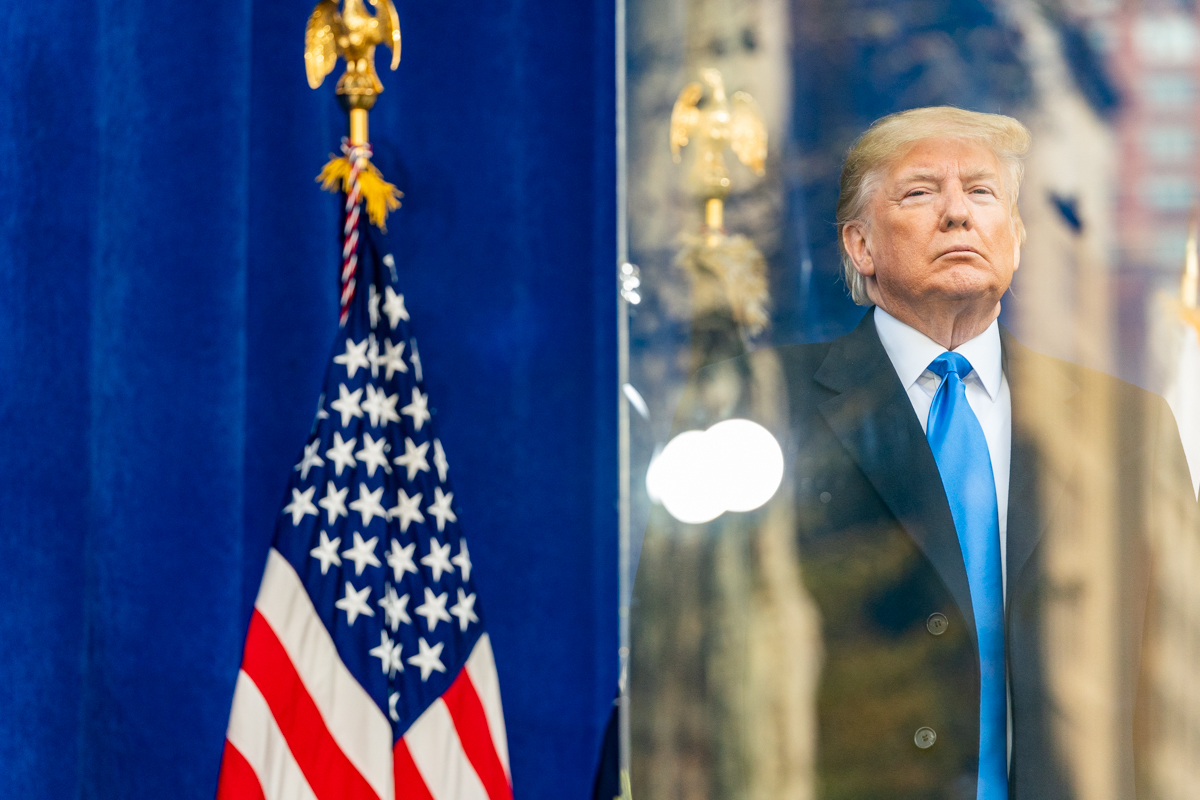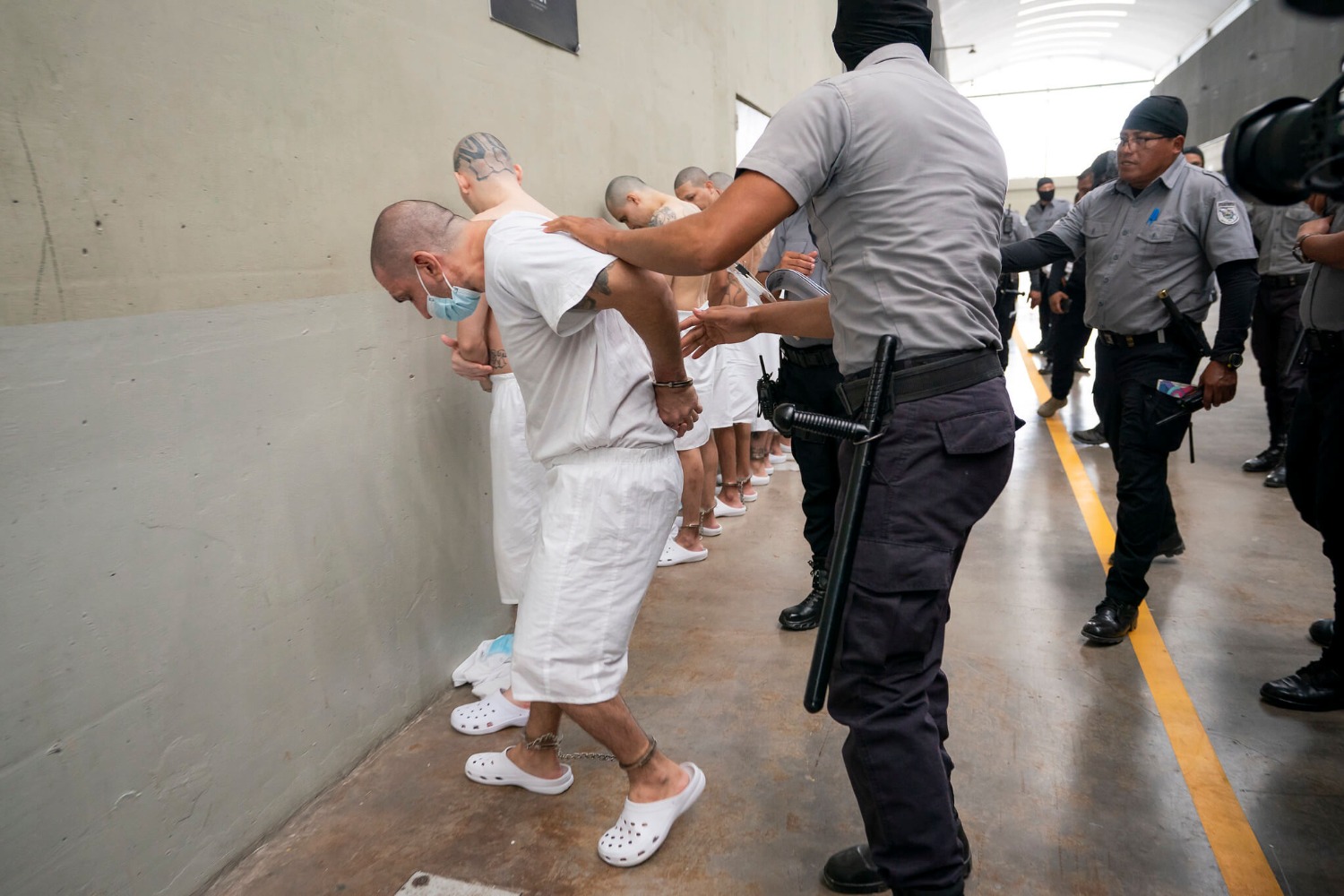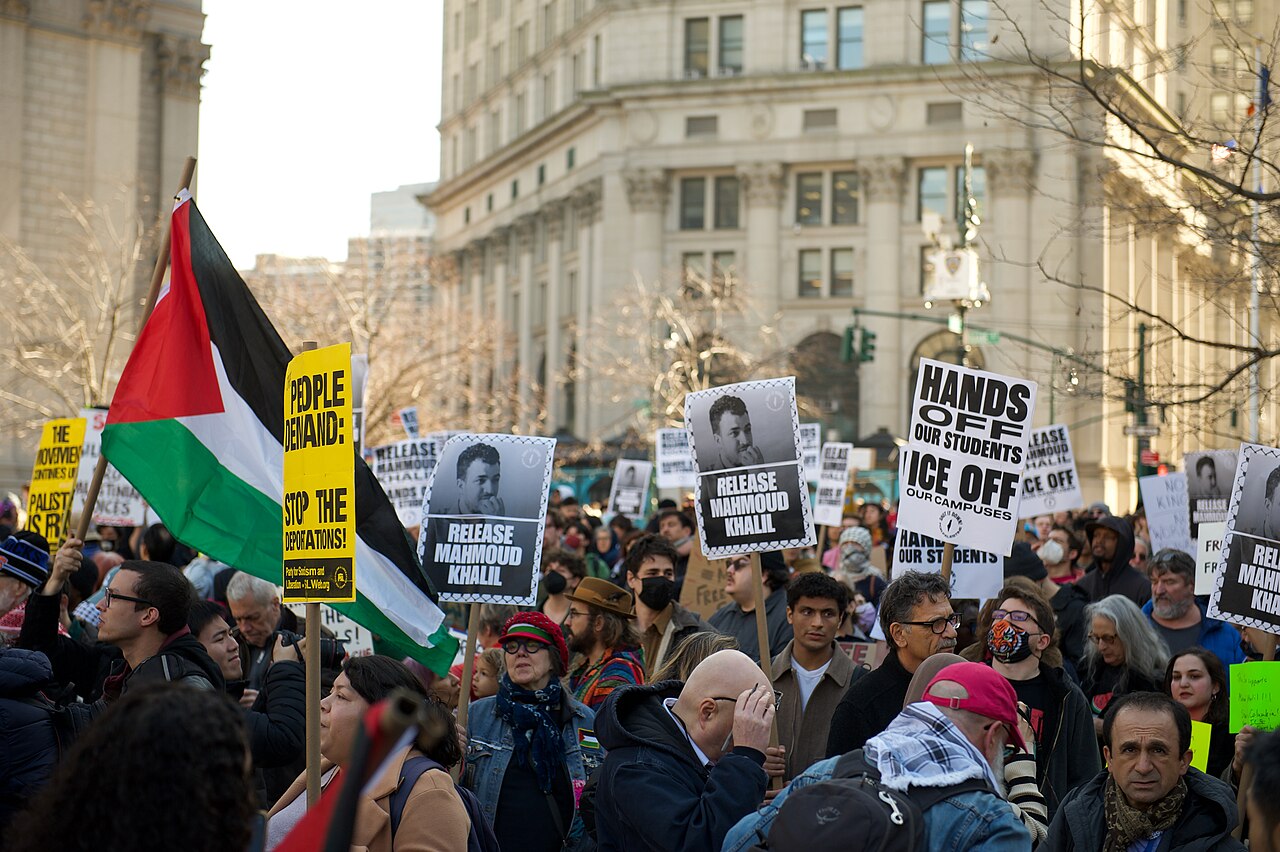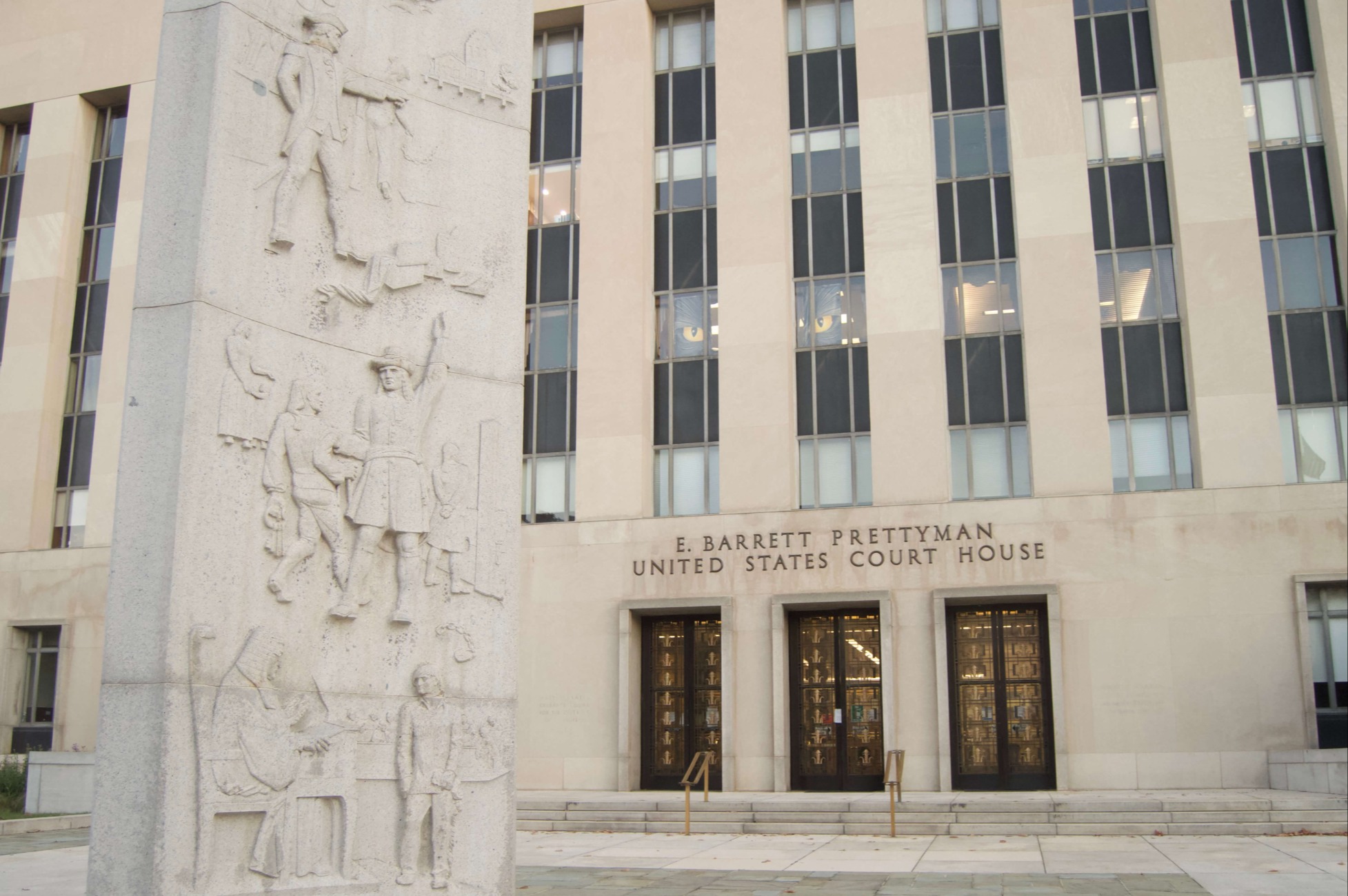Why Did Federal Prosecutors Drop Trump's Hush Money Case?
The answer may shed light on the strength of District Attorney Alvin Bragg’s case against Donald Trump.

Published by The Lawfare Institute
in Cooperation With

When Manhattan District Attorney Alvin Bragg first announced hush money charges against former President Donald Trump in March 2023, commentators were quick to cast doubt on the strength of the case. Among the criticisms leveled against Bragg from both right and left was that the district attorney’s office had simply resurrected a case already considered and abandoned by federal prosecutors in the Southern District of New York (SDNY), who had already investigated Trump and chosen not to bring charges against him under federal campaign finance law for the same scheme. “If anyone should have brought this case,” wrote law professor Jed Shugerman in the New York Times, it was the Justice Department. In the Washington Post, Ruth Marcus questioned whether Bragg could “transmogrify this conduct into a state crime” from its federal roots. On the right, Andrew McCarthy suggested in National Review that Bragg was “politically engineering” federal law “into a new election law of his very own.”
The legal theory and evidence behind the New York charges have come into greater focus in recent weeks, as the district attorney’s office has presented its case before a jury. Now, as Trump’s New York trial moves toward its close, is an opportune moment to reassess SDNY’s decision not to pursue charges against Trump—because the question of why federal prosecutors reached that decision also sheds light on the strength of Bragg’s case and the district attorney’s thinking in bringing the charges. Is the New York case an embarrassment—an example of a politically motivated district attorney pushing forward with a case that federal prosecutors thought was too weak to bring? Or is it instead a righteous case rescued by the district attorney’s office after being abandoned by a Justice Department unable to pull the trigger on the indictment of a current or former chief executive? Or might it be something else entirely?
The federal investigation into Trump’s potential campaign finance violations has been tied together with the district attorney’s probe from the start. In August 2018, the U.S. Attorney’s Office for the Southern District of New York unveiled campaign finance charges—among other charges—against Trump’s fixer Michael Cohen, alleging Cohen’s involvement in orchestrating the hush money schemes to pay off Karen McDougal and Stormy Daniels in the run-up to the 2016 election. Meanwhile, that very same day, the district attorney’s office “opened its initial inquiry into the circumstances surrounding the facts to which Michael Cohen pleaded guilty,” according to an affirmation filed later in the Trump case by Assistant District Attorney Christopher Conroy—though the office almost immediately paused its probe “in order to avoid any risk of interfering with an ongoing federal investigation.”
The charging documents filed by SDNY left uncertain to what extent Trump himself was involved in Cohen’s wrongdoing. But during his plea hearing, Cohen stated in court that he made the payments “in coordination with and at the direction of a candidate for federal office”—meaning, of course, Trump. The Southern District underlined this connection in its December 2018 sentencing memo, repeating that Cohen acted at the behest of “Individual-1.”
It seemed entirely possible that Trump himself might face potential charges in the federal hush money investigation after he left office. The math wasn’t hard: If Cohen violated campaign finance law by coordinating the hush money payments, and if he did so at Trump’s direction, then Trump himself could very well face legal jeopardy. What’s more, in September 2018, the U.S. attorney’s office reached a non-prosecution agreement with American Media, Inc. (AMI), the publisher of the National Enquirer, for its role in the hush money enterprise, and AMI CEO David Pecker was reportedly granted immunity by prosecutors for his testimony. (In 2021, the Federal Elections Commission would also rule that AMI’s involvement violated the Federal Election Campaign Act [FECA].)
All that would be consistent with prosecutors doggedly working up the chain to a possible indictment of the man at the center of the scheme: Trump. Yet in July 2019, a bit less than a year after Cohen’s guilty plea, SDNY acknowledged in a court filing that its investigation into the campaign finance issue had “effectively concluded.” At the time, this seemed to suggest that SDNY had made an affirmative choice not to charge the president—a “declination decision,” in the language of the Justice Department.
In the Manhattan District Attorney’s Office, at least, this announcement kicked the hush money investigation back into gear. “Very shortly after learning that the federal investigation concluded,” Conroy states in his affirmation, “the Office resumed its own investigation into potential New York State law violations by Trump and the Trump Organization.”
Without more information, it was hard to know what might have motivated SDNY not to bring the case. But there is at least one very simple explanation for why the department didn’t move forward: It couldn’t. The Justice Department’s Office of Legal Counsel (OLC) has long taken the position that a sitting president may not be criminally prosecuted. Recall, too, that SDNY announced the shuttering of the investigation just months after the publication of the Mueller report, meaning that prosecutors in the Southern District had just watched as Special Counsel Robert Mueller contorted himself over the problem of how to describe potential criminal violations by a sitting president that nevertheless couldn’t be charged. After watching those contortions, why would SDNY want any part of that?
But there is good reason to think that the key moment in SDNY’s decision-making might not have been in 2019, but in 2021—in other words, that the 2019 letter wasn’t announcing a formal declination at all but only the conclusion of the investigative portion of SDNY’s work. In his book “Untouchable,” former SDNY prosecutor Elie Honig suggests, on the basis of his own reporting, that the office wound down its work in 2019 in light of the OLC memo but “never formally cleared Trump.” After Trump left office in January 2021, according to Honig, SDNY reconsidered whether to bring charges against the now-former president. The five-year statute of limitations on the campaign finance offense had not yet expired, so prosecution remained an option.
Honig points to a number of factors that the office reportedly considered, including the “politically explosive” nature of bringing charges against a former president. Some of the other factors at work, though, might have been more workaday considerations speaking to the underlying strength of the case. Chief among them was the problem of witnesses.
A federal prosecution of Trump on the hush money charges would have relied heavily on Michael Cohen as a star witness—just as Bragg’s prosecution of Trump has done. As prosecutors in the district attorney’s office are grappling with, though, Cohen is not the most reliable witness. He is an admitted liar: At the same time the Southern District announced his plea on the hush money charges, Special Counsel Robert Mueller unveiled a separate plea agreement under which Cohen acknowledged lying to Congress in 2017.
Bragg apparently decided to take the risk of putting Cohen on the stand, but perhaps federal prosecutors reached a different conclusion. This decision may well have been shaped by the Southern District’s unusual approach to dealing with potential cooperating witnesses. Geoffrey Berman, who led the office from 2018 through 2020, describes SDNY’s practice in his memoir on his time in the office: SDNY will offer a cooperating agreement only if a would-be witness agrees to share details about any and all other criminal activity in their past, even on matters unrelated to the case at hand. Cohen, though, would not agree to this arrangement: “[H]e would not discuss his business activities outside his work for the Trump Organization,” Berman states, of the office’s initial negotiations with Cohen. (The Southern District made its irritation with Cohen’s intransigence clear in its sentencing memo.) All this meant that the Southern District wouldn’t have been willing to put Cohen on the stand during any federal trial of Trump, making the case even more difficult to bring.
Like the district attorney’s office, SDNY also seems to have been unable to secure the cooperation of Allen Weisselberg, the Trump Organization’s chief financial officer, who would have been able to testify to Trump’s involvement in the reimbursement payoffs to Cohen. Weisselberg reportedly received immunity to testify before the federal grand jury, but there is no indication that SDNY ever reached a cooperation agreement with him. In fact, the New York Times has reported that SDNY was at one point investigating whether Weisselberg had lied before the grand jury or had otherwise obstructed the investigation—consistent with Weisselberg’s lack of cooperation with the district attorney’s case.
When it comes to the problem of absent or unreliable witnesses, though, Bragg’s office is situated differently than SDNY in important ways. Unlike the Southern District, the district attorney’s office has no policy requiring that cooperating witnesses air all their dirty laundry with prosecutors ahead of time, meaning that Bragg apparently had fewer compunctions about putting Michael Cohen on the stand. It seems that Cohen’s relationship with prosecutors in the Southern District was genuinely strained by the end: During cross-examination by defense attorney Todd Blanche, Cohen acknowledged calling the federal prosecutors, along with the judge in his federal case, “corrupt” and “fucking animals.” Maybe the DA’s office was able to get off on a better foot with their star witness.
The specific charges at issue in the state prosecution, as opposed to the would-be federal case, also make Cohen less of a potential problem for Bragg than he would have been for SDNY. A FECA case against Trump would have required a great deal of evidence about Trump’s knowledge and mental state, which—in the absence of Weisselberg—only Cohen could have provided. The business records charges under which Trump was indicted in New York, though, are much less reliant on Cohen’s testimony.
In charging Trump under FECA, prosecutors would need to have shown that Trump “knowingly and willfully” violated the statute—that, as the Justice Department describes it, he “acted with knowledge that [his] conduct was against the law.” (In its 2017 update to its manual on “Federal Prosecution of Election Offenses,” the department relaxed the standard for just how much knowledge the defendant must have of the relevant law allegedly broken, but the mens rea requirement is still unusually high.) They also would have needed to convince a jury that the hush money payments were made specifically because of the election, rather than covering up Daniels’s and McDougal’s stories to spare Trump’s family embarrassment.
These are not insurmountable challenges, but they would create bumps in the road for any potential prosecution. In 2012, the Justice Department failed to win a conviction against former Democratic Sen. John Edwards on campaign finance charges related to a similar scheme, concerning money paid by wealthy backers of Edwards to support his pregnant mistress during his presidential campaign. The case against Trump would arguably have been stronger in some ways than the case against Edwards. (Among other things, the link between the hush money payments and Trump’s campaign is more direct than in the Edwards prosecution, in which Edwards successfully argued that the payments were made to avoid alerting his dying wife to the affair, rather than to protect his presidential prospects.) Still, the Edwards case unavoidably looms over any analysis of a potential Trump FECA prosecution, and federal prosecutors would likely have needed to rely heavily on Cohen’s testimony to rebut the inevitable defense argument that Trump had sought to silence Daniels not because of his electoral prospects but to spare his family. (Trump’s New York defense has gestured at this argument, though not in as much depth as many commentators expected before the trial.)
Compare this to the structure of the New York charges against Trump under New York Penal Law § 175.10, falsifying business records in the first degree. This is a sweeping statute that, under rulings by New York courts, gives prosecutors wide leeway when it comes to the burden of proof. Despite the convoluted structure of Bragg’s legal theory, perhaps a case charged under § 175.10 simply looked easier to prove to Bragg’s team than the FECA case did to the Southern District—and, crucially, less reliant on the jury’s judgment as to the credibility of Michael Cohen.
Under New York law, falsification of business records is increased from a misdemeanor to a felony by linking that falsification to the “intent to commit another crime and aid and conceal the commission thereof.” Bragg has identified the federal law under which the Southern District charged Cohen, the Federal Election Campaign Act, as a possible “object offense,” that is, the intended or concealed crime that raises the misdemeanor to a felony. Bragg has explained in court filings how FECA also feeds into another potential object offense under New York Election Law § 17-152, which criminalizes conspiring to “promote … the election of any person by unlawful means”—such as, Bragg has suggested, by violating federal election law.
At multiple levels, then, FECA is embedded within the § 175.10 charges. But because the charges themselves focus on business records falsification, it is much easier for Bragg to prove his case by walking the jury through the paper trail and using Cohen to flesh out the story around the edges—which is exactly what the district attorney’s office has done. As New York courts have interpreted the statute, prosecutors don’t need to prove a FECA violation beyond a reasonable doubt—only the intent to commit or cover up a violation—and the structure of Bragg’s legal theory provides a route by which the jury could conceivably find Trump guilty without relying on FECA at all, if jurors instead focus on another of the potential object crimes identified by Bragg.
All this gives Bragg a great deal more flexibility when it comes to Cohen than SDNY would have had. This doesn’t mean that Cohen isn’t a problematic witness for the district attorney. On the contrary, defense counsel Blanche sought to pummel Cohen on his past lies during cross-examination in the New York trial. But it does explain why the Southern District might have decided that Cohen’s unreliability made bringing a case against Trump impossible—and why Bragg might have reached a different conclusion.
Another consideration, though probably a less important one, might have involved SDNY’s confidence in the underlying legal theory itself. It also remains unsettled whether hush money payments can even be campaign contributions to begin with under FECA. The legal theory raised some eyebrows among campaign finance experts when the Justice Department first introduced it in the Edwards case, and because Cohen pleaded out, it hasn’t been tested in court. Former FEC chairman Bradley Smith, a Republican, has argued that the Daniels payment does not constitute a campaign contribution for this reason. (Trump’s defense team in New York has batted around the idea of calling Smith as a witness, but Judge Juan Merchan ruled that almost everything the defense sought to elicit from him would amount to inadmissible expert testimony about the law.) That said, SDNY was apparently confident enough in this theory to move forward with a prosecution of Cohen if he hadn’t pleaded, so perhaps it wouldn’t have held the office back from an indictment of Trump.
And if we’re evaluating legal theories, Bragg’s may not be entirely airtight either, though it certainly seems stronger than many commentators originally assessed it to be when the indictment first became public. Under Bragg’s predecessor, Cyrus Vance, the district attorney’s office apparently had difficulty figuring out how to charge the hush money violations: The possibility of prosecuting Trump on this basis was raised and dropped so many times that prosecutors reportedly began referring to it as the “zombie case.” Bragg appears to have worked out a solution to his satisfaction, though the role of FECA in the New York case initially prompted a flurry of legal questions from commentators, many of which Trump’s lawyers later pointed to as well. Could a federal crime even function as an object offense under § 175.10? Were the charges preempted by federal law as an intrusion on FECA? So far, Trump has struck out with these arguments, both before Justice Merchan and before U.S. District Judge Alvin Hellerstein, who rejected Trump’s preemption argument in dismissing his effort to remove the case to federal court. If Trump is convicted, though, he may well raise these questions again on appeal.
The final consideration at play has to do with the different challenges faced by federal and local prosecutors. For good or for ill, the district attorney’s office is free from any direct influence by Justice Department leadership. But SDNY struggled with interference by this leadership from the beginning. Berman writes that the office had to fight back against a series of efforts by Justice Department leadership in Washington, D.C., to squash the hush money investigation—including by stripping out references to Trump in the initial charging documents against Cohen and an aborted quest by Attorney General William Barr to retroactively undo Cohen’s plea deal.
In 2021, when SDNY decided not to charge Trump, the office was no longer subject to Barr’s meddling. But it might have been influenced by the caution of the new attorney general, Merrick Garland, who has been criticized for being insufficiently willing to move aggressively in pursuing criminal prosecutions of Trump. If the Southern District had the sense that the attorney general would not approve of starting a potential political firestorm by indicting Trump on hush money charges, the office might have been less likely to push the issue.
Bragg, though, is directly elected by Manhattan voters. Perhaps that means that he’s blessedly free from the timorous influence of Garland. Or, seen from another angle, perhaps it indicates that he’s bowing to political expediency by bringing the case in order to pander to his Trump-hating constituency.
How, then, should this additional context shape our understanding of the DA’s decision to bring charges against Trump? The answer depends on how much weight you place on each of the different factors in play. And how you view those factors will likely be somewhat of a Rorschach test for your sense of the Trump case as a whole: whether it’s a righteous prosecution, a terrible mistake, or something in between. But the complicated story sketched out here does suggest that there’s more to Bragg’s case than simply an effort to slap a new coat of paint on weak federal charges.
In the end, though, this added context can get us only so far. Right now, the only opinions that matter as to the strength of the case against Trump are those of the jurors. And they’ll get the chance to cast their votes soon enough.





